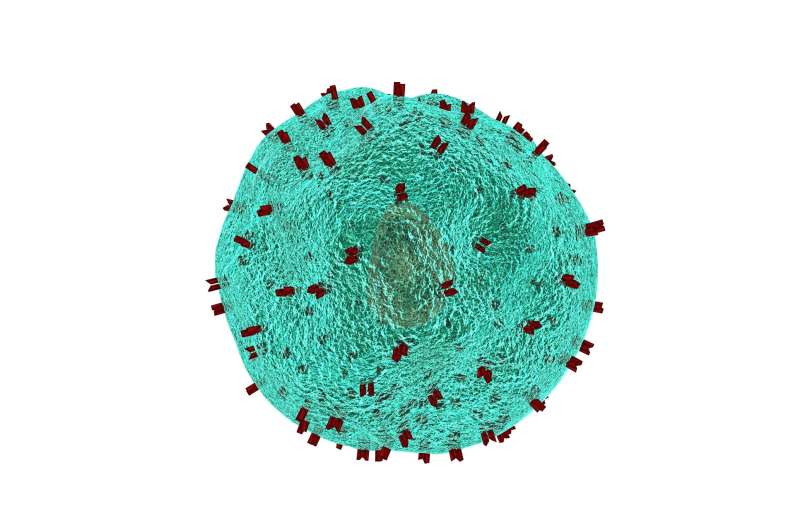Killer T cells could be recruited to ignite immune response against cancer

A University of Alberta researcher has discovered how two signaling molecules recruit immune cells known as "killer" T cells to a specific type of colon cancer with more favorable patient outcomes. The finding may represent a therapeutic strategy to target other types of cancers.
Kristi Baker, assistant professor in the Department of Oncology, examined tumors from patients with mismatch repair deficient colorectal cancer, a type that affects about 10 to 15 per cent of patients. While 85 per cent of colorectal cancers come from polyps, the mismatch repair deficient subset is developed through a different set of mutations.
"All cancer cells have a lot of mutations, but this particular group has a significantly higher number—almost tenfold as much as some of the other cancers," said Baker, who is also a member of the Cancer Research Institute of Northern Alberta and the Women and Children's Health Research Institute.
That higher number of mutations is what gives patients with the mismatch repair deficient tumors more positive outcomes in general. The immune system can sometimes overlook tumors because they look so similar to normal cells, so they aren't recognized as something foreign that needs to be attacked. But the higher number of mutations in mismatch repair deficient tumors means they're very visible to the immune system.
"They're naturally able to attract these killer T cells into the tumor," said Baker. "So patients with this type of cancer do better even without immune therapies, because they tend to have a lot of these tumor-killing T cells already inside the tumor, and if you add immunotherapy on top of that, it gives them a huge boost."
Making immunotherapy more effective
Immunotherapy, a popular treatment strategy for many types of cancer, works by activating specific immune cells inside the tumor that are able to kill the cancer cells. However, said Baker, only a fraction of patients actually respond to those treatments—and typically, it's the patients who already have those cells in place inside the tumor.
To make immunotherapy effective for a larger population, there needs to be a way to recruit those cancer-killing T cells into the tumor, she explained.
One of the ways the body directs immune cells to areas when needed is through the secretion of a type of signaling protein called chemokines. Each particular chemokine attracts a slightly different combination of cells, and after they sound the alarm in the body, the immune cells flood to that area where the chemokines are most concentrated.
The two chemokines Baker and her team looked at, CCL5 and CXCL10, were previously found to have the potential to recruit killer T cells in a tumor environment, but this is the first time they have been shown to be effective with this particular type of cancer. It's also the first time it has been shown that the tumor cells are able to produce the chemokines.
Training T cells to attack cancer cells
The next step for Baker and her team is to further explore how the T cells become activated when they land inside the tumor, and how to improve that process. "I like to use the analogy that T cells are kind of like drug-sniffing dogs: they need to be trained as to what they're supposed to target," said Baker. She plans to look further at a particular cell type, dendritic cells, which are "instructional" cells that help train T cells to recognize what they need to react against.
Some preliminary data from the Baker lab show that dendritic cells in mismatch repair deficient tumors are more effective at the training process. By understanding why, the hope is that the effectiveness can be duplicated in other types of cancer cells.
"We're trying to find more generic, widely applicable ways to transfer the good prognosis we see in these mismatch repair deficient cancers into the other types of cancer," said Baker.
More information: Courtney Mowat et al, Anti-tumor immunity in mismatch repair-deficient colorectal cancers requires type I IFN–driven CCL5 and CXCL10, Journal of Experimental Medicine (2021). DOI: 10.1084/jem.20210108





















